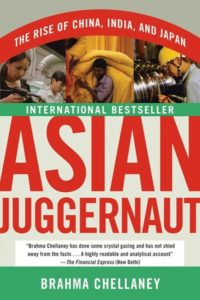 The deepening relationship between Japan and India serves the goal of forestalling the emergence of a China-centric Asia, if they can leverage their relationship to generate progress toward broader cooperation among the region’s democracies, notes Brahma Chellaney, Professor of Strategic Studies at the New Delhi-based Center for Policy Research and author of nine books, including Asian Juggernaut.
The deepening relationship between Japan and India serves the goal of forestalling the emergence of a China-centric Asia, if they can leverage their relationship to generate progress toward broader cooperation among the region’s democracies, notes Brahma Chellaney, Professor of Strategic Studies at the New Delhi-based Center for Policy Research and author of nine books, including Asian Juggernaut.
Another potential impediment to a concert of Indo-Pacific democracies is domestic instability in key countries. In strategically located Sri Lanka, for example, President Maithripala Sirisena has ousted Prime Minister (despite the latter’s parliamentary majority) and called a snap election, even though the constitution does not give him the power to do either. A weakening of the country’s democracy could have strategic ramifications for an economically integrated but politically divided Indo-Pacific.








The question is whether this vision of an Indo-Pacific free of “authoritarianism and aggression” is achievable, including unresolved tensions between Japan and South Korea, he writes for Project Syndicate: